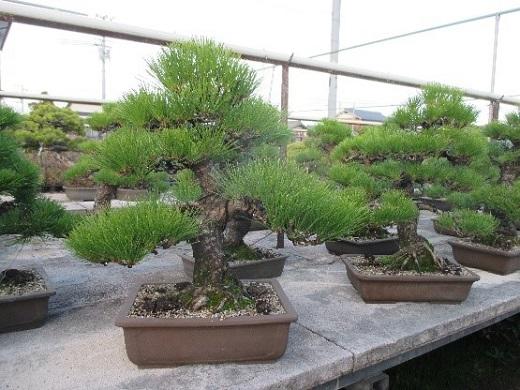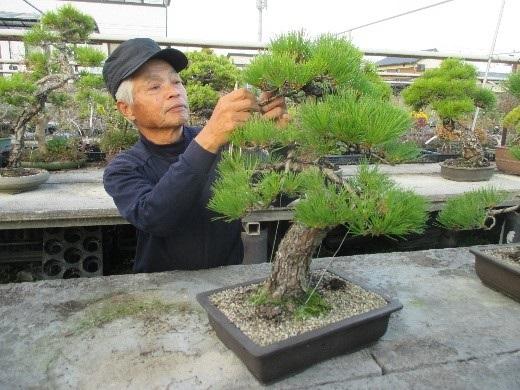


Japanese black pine bonsai can now be exported to the European Union (EU) from October 2020. Pine bonsai, which is regarded to be a symbol of Japanese culture, boasts high popularity overseas, including the EU. However, until now the EU has prohibitead the import of Japanese black pine bonsai from Japan by plant quarantine measure to avoid invasion of two pathogenic fungi. However, as a result of research surveys conducted by the Kagawa Prefecture Agricultural Experiment Station Plant Protection Office , etc., it was confirmed that there are no disease occurences feared by the EU, and the technology to control diseases has been established. Therefore, the EU regulations have been revised, and export is finally possible. Exporting to the EU has been a long-cherished desire of bonsai growers in Takamatsu City, Kagawa Prefecture, which accounts for about 80% of the nationwide share of pine bonsai, and there are great expectations that the lifting of the prohibition on exports will trigger the revitalization of the local agricultural production area.
Formation of a research consortium to lift the ban on exports to the EU
Pine bonsai primarily include Japanese black pine (Fig.1) and Japanese white pine. Bonsai have gained popularity in across the world and overseas sales channels are expected to expand. However, it is not possible to export freely to every country.
The EU, which is wary of pest invasions, previously only allowed the import of Japanese white pine with special conditions imposed. However, in order to prevent the invasion of "leaf rust", which causes leaves to turn orange similar to rust, and "gall rust", which causes pine trees to swell with bumps, the import of Japanese black pine bonsai from Japan is prohibited.
With this background, Kagawa Prefecture, which is one of Japan's leading pine bonsai growing areas, has formed a research consortium with the National Agriculture and Food Research Organization (NARO), Tsukuba University, and bonsai grower Yukihiko Konishi since 2017 to realize exports to the EU and has been conducting surveys of pest occurrence and developing pest control methods.

Development of pest control methods
Surveys of the occuerence of pine needle rust and pine gall rust were conducted for three years from 2017 in Kinashi-cho and Kokubunji-cho in Takamatsu City, Kagawa Prefecture, which are well known areas where pine bonsai are grown. Upon investigation of Japanese black pine and Japanese white pine bonsai, it was found that the Amur cork tree, an alternate host of needle rust (*See note) , was not present in the vicinity, and no disease occurences were observed in pine bonsai. There were oak and chestnut trees in the surrounding area, which are alternate hosts of Asian pine gall rust , but the occurrence of the disease in these intermediate hosts or in the pine bonsai could not be confirmed.
Moreover, based on the results of research to date, we created the spray schedule to control pests for bonsai for export. In order to confirm the practicality of the pest control calendar, chemicals such as mancozeb wettable powder (fungicide) were sprayed on Japanese white pine and Japanese black pine bonsai trees in Kinashi-cho and Kokubunji-cho in accordance with the pest control calendar.
Based on these research results, the Ministry of Agriculture, Forestry and Fisheries (MAFF) held repeated discussions with the EU authorities in charge of plant quarantine, and the export prohibition was lifted from October 1, 2020. However, this does not mean that exports can start immediately. For future exports, quarantine measures such as the following are required:
- Cultivation shall be managed at fields registered with Plant Protection Station, MAFF for two consecutive years,
- Inspections shall be conducted by the Plant Protection Station six times annually, and
- Export inspections by plant protection officers shall be passed.
For this reason, full-scale exports are likely to begin in 2023 or later, after two years of cultivation management.
Toward the revitalization of the local industry of Takamatsu City
Bonsai growers in Takamatsu City are extremely pleased to see the prohibition on exports to the EU lifted. While domestic demand for bonsai is sluggish, the development of overseas sales channels is progressing steadily. The Takamatsu Bonsai Export Promotion Association has held annual business meetings to promote exports mainly to the EU, and has invited buyers from overseas. Yukihiko Konishi, chairman of the Promotion Association, who has exported nearly half of the bonsai to the EU (Fig.2), remarked, "The lifting of the prohibition on exports to the EU will lead to an increase in the income of bonsai growers and the revitalization of local industries. We would like to take this opportunity to pass on traditional Japanese arts to future generations."

* alternate host
needle rust fungus and Asian pine gall rust fungus have the property of traveling back and forth between two completely different types of plants during their life cycles. Among the two different host plants, the pine species, which are more susceptible to economic damage, and the Amur cork tree, oak, etc., which are not, are referred to alternate hosts. If these alternate hosts are not within 300m of the pine bonsai is planted, pine leaf rust and gall rust can be avoided.
Project name
The special scheme project on vitalizing management entities of agriculture,forestry and fisheries
Project period
FY 2017 to 2019
Title
Development of pest control methods necessary for the lifting of the export prohibition on pine bonsai, etc.
Leading research institutes
Kagawa Prefecture Agricultural Experiment Station Plant Protection Office (Research Consortium for the Lifting/Relaxing of the prohibition on Pine Bonsai Exports)
